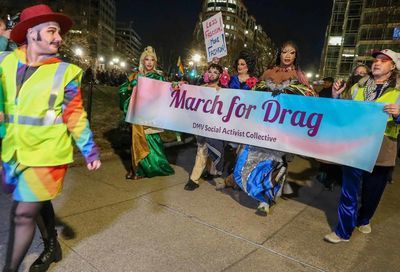Arizona governor vetoes bill seeking to ban LGBTQ content in schools
But Doug Ducey also signed an executive order requiring schools to notify parents before LGBTQ issues are discussed in class.
By John Riley on April 23, 2021 @JRileyMW

Arizona Gov. Doug Ducey (R) has vetoed a controversial bill that would have required parental permission before teachers could even mention LGBTQ-related content, even in passing, in sex education or history classes.
However, Ducey also issued an executive order requiring public notice of any LGBTQ-related lessons before it can be used in Arizona classrooms, a concession to advocates of the curriculum bill who wish to inform parents, particularly those with religious beliefs opposing homosexuality, before their children are introduced to topics that they may find objectionable.
In vetoing Senate Bill 1456, Ducey called the bill “broad and overly vague,” saying it could lead to consequences and be misinterpreted by school administrators in such a broad manner that it might bar teachers from addressing sexual abuse prevention education to younger children.
But he did call in his executive order for more transparency regarding topics broached in sex education classes, including a requirement that schools post materials and content online for parental review 60 days before broaching potentially controversial topics in order to allow parents to “opt in” to sex education classes, according to the Arizona Republic.
While Arizona is currently one of five states that requires parents to “opt-in” before receiving instruction in sexual education, the bill, proposed by Sen. Nancy Barto (R-Phoenix), was criticized for being overly stringent by requiring parental permission before subjects involving gender identity, sexual orientation, or HIV/AIDS prevention education could be addressed in the classroom.
Critics argued that the “gag rule” imposed by the law would have penalized teachers for even broaching facially-neutral historical facts about the LGBTQ community, or for allowing books with LGBTQ content on a reading list for literature classes.
Two years ago, Ducey signed a law pushed by lawmakers to end the state’s “No Promo Homo” law, which prohibited teachers from casting anything having to do with LGBTQ issues in a positive or even neutral light.
Some critics worried that Barto’s bill would effectively reverse that positive development, and open up the state to legal action, just as the “No Promo Homo” law had.
Michael Soto, of Equality Arizona, praised Ducey for allowing for more transparency without marginalizing LGBTQ students by forbidding certain content, such as discussions around sexual orientation and gender identity as part of sex ed classes.
Tory Roberg, the parent of a trans child who led protests against the bill, was happy to see Ducey veto the bill. But she believes the executive order only affirms what is already in state law.
“The school board meetings about sex education will give parents the opportunity to opt out of sex education,” Roberg wrote in an email to the Arizona Republic. “That sends a message that LGBTQ issues are controversial and can serve to alienate youth who identify that way. We have a long way to go when it comes to accepting and loving LGBTQ and trans kids as a society.”
See also: Arizona Republican compares nonbinary individuals to someone identifying “as a chicken”
LGBTQ advocates praised Ducey’s actions, saying the bill would have had far-reaching implications.
“History shows that restricting curriculum disproportionately impacts LGBTQ children, and Governor Ducey’s choice to veto this bill will prevent further discrimination and disinformation, and potentially save lives,” Alphonso David, the president of the Human Rights Campaign, said in a statement.
“This bill would have threatened the ability for all students — no matter their sexual orientation or gender identity — to feel supported by their schools and families to grow into who they are without fear. This legislation also would have paved the way for efforts to withhold important LGBTQ history and literature from their education,” David noted. “We must always work to protect LGBTQ students from discrimination while giving young people all the information they need to be comfortable navigating their adolescence and live freely and openly.”
“Regardless of their sexual orientation or gender identity, students in Arizona deserve to have access to high-quality sex education and information about LGBTQ history, literature, and current events,” added Bridget Sharpe, HRC’s Arizona State Director. “This veto will protect LGBTQ children and ensure every student has access to enriching educational materials that tell the story of LGBTQ people in this country.”
Read more:
HUD withdraws Trump-era revisions restricting shelter access to transgender people
Kansas Gov. Laura Kelly vetoes bill seeking to bar transgender athletes from sports
Texas ‘Sexual Content’ Bill Would Criminalize Literary Works
A proposed Texas law could jail adults for allowing minors to access books with "sexual" content, including The Odyssey and The Color Purple.
By John Riley on March 31, 2025 @JRileyMW
Texas lawmakers proposed a slew of bills that would criminalize providing access to books or learning materials containing "sexually explicit content," including some iconic literary works, to minors.
Currently, if someone is accused of providing sexually explicit content to a child, they can argue, as an affirmative defense, that the content of the novel or work in question has scientific, educational, or literary purposes.
But the bills introduced in the Texas Legislature seek to eliminate that defense, reports the independent news outlet Popular Information.
State Dept. Permanently Bans Trans Athletes from Entering U.S.
Trans athletes seeking to travel to the U.S. for women's sporting events will be permanently forbidden from entering the country.
By John Riley on February 26, 2025 @JRileyMW
The U.S. State Department has ordered officials worldwide to deny visas to transgender athletes attempting to come to the U.S. for sports competitions.
It is also ordering permanent visa bans against transgender people whose gender marker on their application doesn't match their assigned sex at birth.
A State Department cable obtained by The Guardian instructs visa officers to enforce a section of the Immigration and Nationality Act that allows the United States to refuse entry to any visa applicant who commits identity fraud or misrepresents who they are.
Unlike regular visa denials, anyone violating that section can be permanently refused entry to the United States, effectively constituting a lifelong ban.
Trump Administration May Close CDC’s HIV Prevention Division
HIV prevention advocates worry about the possible effects of defunding federal HIV prevention programs.
By John Riley on March 22, 2025 @JRileyMW
The Trump administration is considering a plan to eliminate the Centers for Disease Control and Prevention's (CDC) Division of HIV Prevention.
The CDC provides approximately $1 billion per year on domestic HIV prevention, funneling funds to states and territories, who then distribute it to local health departments and organizations.
The money primarily goes toward testing efforts to detect and respond to HIV outbreaks, carrying out campaigns to educate the public about the disease, and to encourage the adoption of prevention methods, including condoms and the use of pre-exposure prophylaxis (PrEP) to reduce chances of transmission.
Support Metro Weekly’s Journalism
These are challenging times for news organizations. And yet it’s crucial we stay active and provide vital resources and information to both our local readers and the world. So won’t you please take a moment and consider supporting Metro Weekly with a membership? For as little as $5 a month, you can help ensure Metro Weekly magazine and MetroWeekly.com remain free, viable resources as we provide the best, most diverse, culturally-resonant LGBTQ coverage in both the D.C. region and around the world. Memberships come with exclusive perks and discounts, your own personal digital delivery of each week’s magazine (and an archive), access to our Member's Lounge when it launches this fall, and exclusive members-only items like Metro Weekly Membership Mugs and Tote Bags! Check out all our membership levels here and please join us today!
The Magazine
-
Most Popular
 Awesome Con Gallery: Rage Gear Studios
Awesome Con Gallery: Rage Gear Studios  'Glengarry Glen Ross' Is An Abusive Night of Theater
'Glengarry Glen Ross' Is An Abusive Night of Theater  Greece to Ban Surrogacy for Gay Male Couples
Greece to Ban Surrogacy for Gay Male Couples  'Porn Star University' Started by Gay-for-Pay Creator Andy Lee
'Porn Star University' Started by Gay-for-Pay Creator Andy Lee  'A Nice Indian Boy' Spares No Layer of Sentiment
'A Nice Indian Boy' Spares No Layer of Sentiment  Broadway's Grand and Glorious 'Purpose'
Broadway's Grand and Glorious 'Purpose'  Awesome Con Celebrates the Geek in All of Us
Awesome Con Celebrates the Geek in All of Us  Trans Sex Worker Kills Client After He Demands Money Back
Trans Sex Worker Kills Client After He Demands Money Back  Ban on Homosexuality Reinstated in Trinidad and Tobago
Ban on Homosexuality Reinstated in Trinidad and Tobago  Cherry 2025 Wields the Dance Power of the Elements
Cherry 2025 Wields the Dance Power of the Elements
 Broadway's Grand and Glorious 'Purpose'
Broadway's Grand and Glorious 'Purpose'  'Glengarry Glen Ross' Is An Abusive Night of Theater
'Glengarry Glen Ross' Is An Abusive Night of Theater  Greece to Ban Surrogacy for Gay Male Couples
Greece to Ban Surrogacy for Gay Male Couples  Cherry 2025 Wields the Dance Power of the Elements
Cherry 2025 Wields the Dance Power of the Elements  'A Nice Indian Boy' Spares No Layer of Sentiment
'A Nice Indian Boy' Spares No Layer of Sentiment  Awesome Con Gallery: Rage Gear Studios
Awesome Con Gallery: Rage Gear Studios  Russia Bans the Elton John AIDS Foundation
Russia Bans the Elton John AIDS Foundation  Trans Sex Worker Kills Client After He Demands Money Back
Trans Sex Worker Kills Client After He Demands Money Back  This Week's Advertisers: Team Pride - April 3, 2025
This Week's Advertisers: Team Pride - April 3, 2025  Sports Drama 'American Fast' Scores at Theater Alliance
Sports Drama 'American Fast' Scores at Theater Alliance
Scene
Metro Weekly
Washington's LGBTQ Magazine
P.O. Box 11559
Washington, DC 20008 (202) 638-6830
About Us pageFollow Us:
· Facebook
· Twitter
· Flipboard
· YouTube
· Instagram
· RSS News | RSS SceneArchives
Copyright ©2024 Jansi LLC.










You must be logged in to post a comment.